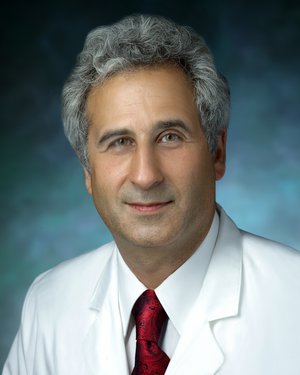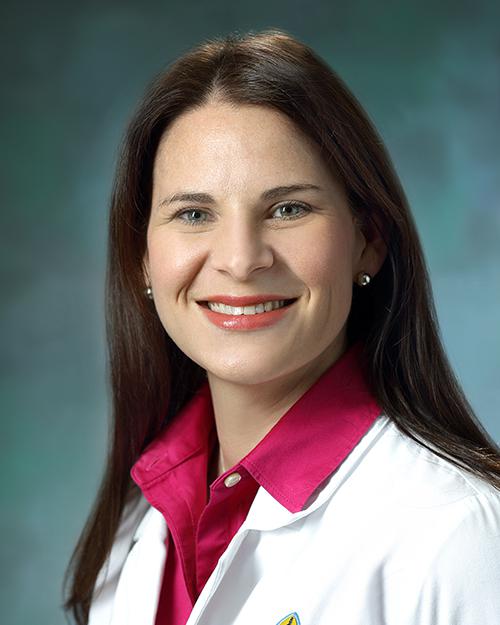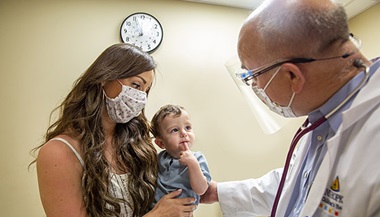Patient Story
Pre-Term Bleeding: Melissa’s Story

Patient Story Highlights
- Melissa Grant, mother of two, was pregnant with her third child when she experienced severe bleeding.
- Putting her unborn son’s survival ahead of her own, Melissa sought help at Johns Hopkins’ Center for Fetal Therapy.
- After a total of 26 weeks of bedrest, Melissa gave birth to Miles, who is thriving and growing healthy and strong. Melissa is giving back by volunteering at the hospital to improve long-term patient stays.
Melissa was used to being on her feet. Although she had put her marine biology career on hold to homeschool her two children just outside of Easton, Maryland, she was on the go every day.
Melissa and her husband were not expecting much to change when she became pregnant with their third child, a boy they planned to name Miles. But just six weeks into her pregnancy, Melissa started bleeding heavily.
Having experienced bleeding during her second pregnancy, Melissa wasn’t completely surprised, but this time was worse. Miles, however, seemed unaffected and in normal health when examined by Melissa’s obstetrician. The baby’s resiliency was mystifying, as was the cause of Melissa’s bleeding. She consulted a hematologist specializing in blood disorders, but still couldn’t get a diagnosis.
During Melissa’s second pregnancy, her obstetrician had prescribed two months of bedrest. This time, however, her current doctor said she doubted it would make a difference. But Melissa believed bedrest was the right thing to do.
“My body told me to hunker down, so that’s what I did. The bleeding didn’t stop, but I noticed it was more manageable when I wasn’t moving around,” she says.
A Worsening Situation
After 12 weeks on bedrest without improvement, Melissa and her husband were desperate for answers. Every passing day of unexplained bleeding put her pregnancy — and Miles’ life — at risk.
They turned to a maternal-fetal medicine specialist close to their Eastern Shore home for an explanation. During her ultrasound, Melissa remembers, “The doctor had a grave look on his face.”
Moments later, she started hemorrhaging again, and her water broke. Suddenly, Melissa and her unborn baby were in critical danger. The ruptured amniotic sac left Melissa in danger of an infection. Her obstetrician recommended inducing labor, which, at only 18 weeks, Miles would likely not survive.
“I’ve never been so scared,” Melissa recalls. “I was so worried about my husband and my two children and what would happen if I weren’t there for them.
But then, she says she remembered a line from a poem by Robert Frost: “But I have promises to keep.” According to Melissa, Miles seemed to be fighting to hang on, with a strong heartbeat and movement typical of a baby further along in development.
In that moment, Melissa made a choice: She’d fight for his survival. “It was almost like I made a deal with Miles, promising to bring him earthside. I kept whispering to him, ‘I’ve got your back.’”
Once she was well enough to leave the hospital, Melissa’s maternal-fetal medicine specialist referred her to Ahmet Baschat, M.D. and Jena Miller, M.D. at Johns Hopkins’ Maternal-Fetal Medicine & Obstetric Services. In the meantime, she was to stay on bedrest until she was ready to be admitted.

Saving Miles
Finally, at 23 weeks, Miles had at least a slim chance of surviving if labor occurred early. Melissa was admitted to The Johns Hopkins Hospital because she was still at risk for preterm birth and intrauterine infection. She immediately received medicine to stimulate the baby’s lung development.
The idea was to stay at The Johns Hopkins Hospital until June and deliver at 34 weeks — nine weeks away — provided labor didn’t start sooner. Melissa says there were a few scares during that time, but she and Miles and the team persevered, one day at a time.
During her time on bedrest, she appreciated the care of everyone at Johns Hopkins. “Dr. Miller and Dr. Baschat came in every single day.” She says that Carol, the worker who cleaned her room, also made an impression: “She was absolutely fabulous,” Melissa says. “It definitely makes a difference.”
“The hardest part,” she recalls, “was leaving family at home.” Her teenage daughter bravely supported her mom during the absence, notes Melissa, while her six-year-old son was a little less certain about what was going on. But overall, the entire family stayed strong to improve the odds for their newest family member.
Weekly sonograms of Miles helped Melissa stay encouraged. Sonographer Sarah Millard, whom Melissa describes as “a ray of sunshine,” describes her role during that difficult time: “Patients who are admitted usually look forward to their weekly ultrasounds. It helps get them through the hard times when they are missing their families and are feeling homesick.
“I tried to make those times as special as I could for her and get as many pictures as I could to give to the family to help take away some stress.”

Welcoming Miles and Helping Others
Melissa made it to 32 weeks, and then Miles, still in breech position, was born by cesarean section. He stayed in the neonatal intensive care unit (NICU) for several weeks. When he was healthy enough to be transferred for continued care closer to home, Melissa had mixed feelings. “I had come to trust Hopkins so much,” she says.
Today, Miles is a curious, vigorous preschooler who’s still determined to live life to the fullest. “Miles is doing absolutely wonderfully,” she says. “He’s the healthiest child we’ve ever had. He finds wonder in the smallest things.” She adds that he recently became fascinated with the flag crew doing road construction near the Grants’ home, and made one of the workers a card.
Throughout Melissa’s pregnancy, Miles had been limited to one position and couldn’t move around as much as he could have, had there been more amniotic fluid surrounding him. But Melissa notes that a bit of physical therapy early on helped him keep pace with motor development milestones. These days he’s a jubilant little boy whom Melissa says loves everyone he meets.
“Miles has never met a stranger,” Melissa says with a laugh.” He has so much joy, gusto and enthusiasm. There’s nothing he can’t do.”
Our happy ending was a gift, and I know it doesn’t always end this way.
Melissa Grant
While mother and son are healthy now, Melissa says she won’t forget her journey: “The care we received was second to none — phenomenal.”
Her experience motivated her to help other expectant mothers in similar situations. “When women are on bedrest for a length of time, they have lives that are left behind, and that’s what compelled me to join The Johns Hopkins Hospital’s Patient and Family Advisory Council.” This group comprises staff and volunteers who meet monthly to discuss and advance ways to improve the patient and family experience at the hospital.
“Our happy ending was a gift, and I know it doesn’t always end this way.”






